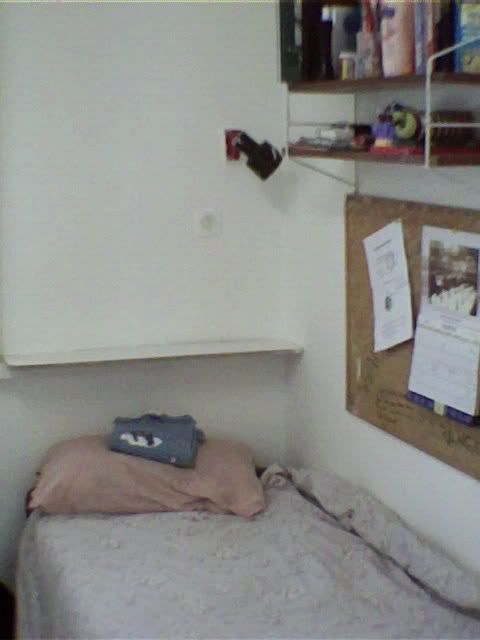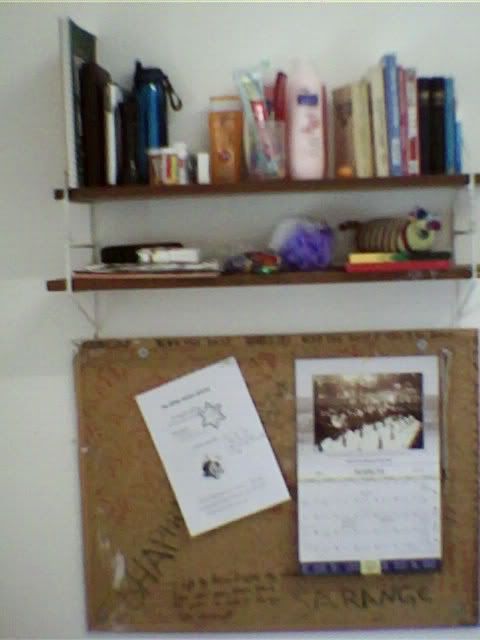Settling In Part 2
Something I've noticed in the last week is that despite the rockets fired from the Gaza Strip on the 19th and the bombings in Jerusalem a couple days ago, life goes on here as normal. Up north there is little fear of an attack, but we're told to keep a heightened level of awareness. Be wary of any bags or boxes left unattended, and if you must hitchhike (also called 'tramping'), be careful.
As I suspected, a few days ago I got a sore throat. It was gone within 48 hours, though. And thus far I've managed to avoid getting traveler's diarrhea (despite drinking the water almost from day one).
On Sunday, it turned out that both my roommate and I had turned up a day early. Her name is Yoma, and she is from India. She's very sweet, and made aliyah (citizenship) last week. Like me, she doesn't speak or read any Hebrew, so we'll also be study buddies and in the same class level.
Our room is meant for three, but there are only the two of us in the room. There are three rooms in the girl's hallway (there are that few of us), two toilets, and a shower. The bathrooms are about the size of a small closet, and in one you need to constantly step over the toilet to open the door because the width is less than two feet. Very, very tiny. The boys occupy the other three-quarters of the building. We have a separate building for the ulpan offices, laundry pick-up, and a break room/classroom.
This is our room not long after I arrived.


These are a couple pictures of my sleeping area. I also have an alarm clock on that shelf (thank you SO much, Dad!) since I need to get up at 5 AM.
Final census of the ulpan population: Six females (all showed up) and about eighteen males (not all of them showed up, as far as I know). Nationalities were all over the place: India, Australia, South Africa, Great Britain (one from England, one from Scotland), Italy (both of them named David, and neither can speak English...what are the odds?), France, Canada, and the United States (about a third of them are American). I believe we also have one Portuguese guy. Most of us can speak English, and almost everyone else already knows a little Hebrew. Most of them are here to make aliyah, or already have.
Laundry is taken in by the individual and washed as a group, separated into cotton and synthetics, darks and lights, shirts and pants. Underwear and socks are washed together in a mesh bag. Each person has to sew a number on their clothing, and the color of the thread indicated to which group it goes: ulpan students, soldiers, or general community. Each bag is similarly labeled. The individual needs to pick up his or her own clothing; the underwear at the laundry itself, and the other clothing wherever the program director takes it for re-dispensation.
Meals are eaten in a cafeteria, or chaderochel. Except on Shabbat, everyone gets their own food from a series of carts. The food is kosher, so no meat when there is milk served, and vice versa. All dishes used for serving and eating either meal is kept separate from the other. Milk meals are for lunch and dinner, and meat is served during lunch.
On Wednesday the majority of us were run through blood tests for AIDs and HIV. Then we were tested into our level of Hebrew class--naturally, I ended up in group Aleph, the very lowest class, because I'm an idiot and didn't devote the last half-year to at least learning ALL the letters instead of just a few. Classes will start next week.
Wednesday and Thursday were also devoted to a quick tour of the kibbutz. The extent of the fields is staggering; they reach several kilometers south and west to the Gilboa Mountains bordering the West Bank, and almost all the way to the Jordan River in the east. The kibbutz grows the seven grains of Israel--more on that later--among other foods, and is one of the first and foremost organic farms in the world. Not everything is grown organically, but all of the food eaten here was grown here organically, and everything near the community (the farmland surrounds the housing) to avoid pesticides and the like from poisoning the kibbutzniks.
The lawns within the community are practically sacred. Since the Jews who founded this community came from Germany before WWII, they fought and died for this land, raising it from the swamp. The grass is not to be trampled on, out of respect for these sacrifices. Also, we get yelled at if we do.
There is a thrift store and a small supermarket on the kibbutz grounds. Funny money, bought with real shekels (which seems...a bit unnecessary. Why not just use shekels?), is used to buy things.
On Thursday, students who didn't have to go to Bet She'an or Afula for anything relating to phones or setting up bank accounts went to work. It was raining all day yesterday, and let me tell you: Weeding grapevines in the rain is no fun at all. Today it was somewhat drier, and in the afternoon the sun came out. On both days I had to get up at 5 AM and work until 8:30, when we had breakfast, then we went back to work from 9 AM to noon. The upside to working so early? You get the afternoon free. The downside? You have to get up with or before the sun, which is hell for someone who's a night owl and takes forever to get to sleep.
Shabbat starts in a couple hours, which is why I'm not making this post after the day's activities are over. The use of computers and writing of any sort is forbidden on Shabbat, though we may break this tradition within our own rooms. However, the wi-fi there is absolutely terrible, so...posting now. I'll leave more details on Shabbat after work on Sunday (yes, we work Sunday through Friday).
See you then!
As I suspected, a few days ago I got a sore throat. It was gone within 48 hours, though. And thus far I've managed to avoid getting traveler's diarrhea (despite drinking the water almost from day one).
On Sunday, it turned out that both my roommate and I had turned up a day early. Her name is Yoma, and she is from India. She's very sweet, and made aliyah (citizenship) last week. Like me, she doesn't speak or read any Hebrew, so we'll also be study buddies and in the same class level.
Our room is meant for three, but there are only the two of us in the room. There are three rooms in the girl's hallway (there are that few of us), two toilets, and a shower. The bathrooms are about the size of a small closet, and in one you need to constantly step over the toilet to open the door because the width is less than two feet. Very, very tiny. The boys occupy the other three-quarters of the building. We have a separate building for the ulpan offices, laundry pick-up, and a break room/classroom.
This is our room not long after I arrived.


These are a couple pictures of my sleeping area. I also have an alarm clock on that shelf (thank you SO much, Dad!) since I need to get up at 5 AM.
Final census of the ulpan population: Six females (all showed up) and about eighteen males (not all of them showed up, as far as I know). Nationalities were all over the place: India, Australia, South Africa, Great Britain (one from England, one from Scotland), Italy (both of them named David, and neither can speak English...what are the odds?), France, Canada, and the United States (about a third of them are American). I believe we also have one Portuguese guy. Most of us can speak English, and almost everyone else already knows a little Hebrew. Most of them are here to make aliyah, or already have.
Laundry is taken in by the individual and washed as a group, separated into cotton and synthetics, darks and lights, shirts and pants. Underwear and socks are washed together in a mesh bag. Each person has to sew a number on their clothing, and the color of the thread indicated to which group it goes: ulpan students, soldiers, or general community. Each bag is similarly labeled. The individual needs to pick up his or her own clothing; the underwear at the laundry itself, and the other clothing wherever the program director takes it for re-dispensation.
Meals are eaten in a cafeteria, or chaderochel. Except on Shabbat, everyone gets their own food from a series of carts. The food is kosher, so no meat when there is milk served, and vice versa. All dishes used for serving and eating either meal is kept separate from the other. Milk meals are for lunch and dinner, and meat is served during lunch.
On Wednesday the majority of us were run through blood tests for AIDs and HIV. Then we were tested into our level of Hebrew class--naturally, I ended up in group Aleph, the very lowest class, because I'm an idiot and didn't devote the last half-year to at least learning ALL the letters instead of just a few. Classes will start next week.
Wednesday and Thursday were also devoted to a quick tour of the kibbutz. The extent of the fields is staggering; they reach several kilometers south and west to the Gilboa Mountains bordering the West Bank, and almost all the way to the Jordan River in the east. The kibbutz grows the seven grains of Israel--more on that later--among other foods, and is one of the first and foremost organic farms in the world. Not everything is grown organically, but all of the food eaten here was grown here organically, and everything near the community (the farmland surrounds the housing) to avoid pesticides and the like from poisoning the kibbutzniks.
The lawns within the community are practically sacred. Since the Jews who founded this community came from Germany before WWII, they fought and died for this land, raising it from the swamp. The grass is not to be trampled on, out of respect for these sacrifices. Also, we get yelled at if we do.
There is a thrift store and a small supermarket on the kibbutz grounds. Funny money, bought with real shekels (which seems...a bit unnecessary. Why not just use shekels?), is used to buy things.
On Thursday, students who didn't have to go to Bet She'an or Afula for anything relating to phones or setting up bank accounts went to work. It was raining all day yesterday, and let me tell you: Weeding grapevines in the rain is no fun at all. Today it was somewhat drier, and in the afternoon the sun came out. On both days I had to get up at 5 AM and work until 8:30, when we had breakfast, then we went back to work from 9 AM to noon. The upside to working so early? You get the afternoon free. The downside? You have to get up with or before the sun, which is hell for someone who's a night owl and takes forever to get to sleep.
Shabbat starts in a couple hours, which is why I'm not making this post after the day's activities are over. The use of computers and writing of any sort is forbidden on Shabbat, though we may break this tradition within our own rooms. However, the wi-fi there is absolutely terrible, so...posting now. I'll leave more details on Shabbat after work on Sunday (yes, we work Sunday through Friday).
See you then!